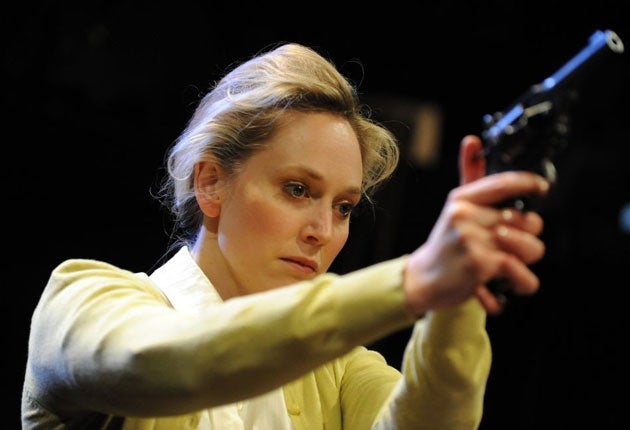Plenty, Crucible Studio, Sheffield

Your support helps us to tell the story
From reproductive rights to climate change to Big Tech, The Independent is on the ground when the story is developing. Whether it's investigating the financials of Elon Musk's pro-Trump PAC or producing our latest documentary, 'The A Word', which shines a light on the American women fighting for reproductive rights, we know how important it is to parse out the facts from the messaging.
At such a critical moment in US history, we need reporters on the ground. Your donation allows us to keep sending journalists to speak to both sides of the story.
The Independent is trusted by Americans across the entire political spectrum. And unlike many other quality news outlets, we choose not to lock Americans out of our reporting and analysis with paywalls. We believe quality journalism should be available to everyone, paid for by those who can afford it.
Your support makes all the difference.Britain's post-war years have long been viewed as some kind of austere and pent-up wait for the liberation of the 1960s – all damp bedsits, powdered egg and Bovril. But despite the rationing and the lack of central heating it was surely an exciting time to be alive. As old-school diplomat Sir Leonard Darwin explains early on in Plenty – there are jobs to be done, roads to be built and land to be tilled. There was also Charlie Parker, some great-looking clothes and – assuming you were part of a "loose Pimlico set" – the prospect of bohemian sex, booze aplenty and even the occasional bong.
Of course, those were the lucky ones. The unlucky ones had perished naked on the floors of Buchenwald, a point made by the gun-toting, swivel-eyed heroine Susan Traherne, played brilliantly by Hattie Morahan.
A former courier in the special operations executive in occupied France, nothing in her later life ever quite lives up to the intensity of those experiences or – as we learn later – the scale of the expectation of happiness in the sunlit day of war's end. Certainly not working as a clerk in a boring shipping office, nor writing advertising copy for Macmillan's consumer society and definitely not as the unsuitable wife of slow-stream diplomat Raymond Brock.
What is so thoroughly enjoyable about director Thea Sharrock's revival of David Hare's 1978 play is not just the superbly evoked period setting or the fine acting but the interplay of Susan's woefully misunderstood "psychiatric cabaret" set against the eerily familiar events of the age notably Suez where the amiable hypocrisy of Empire perishes ingloriously in the Egyptian sand. Of course, it is not just current events in Middle East that make the retelling of Hare's play so prescient. The prospect of evergrowing plenty is also fading for new middle-class generations for the first time since the war and we must all face up to the new limits on our own quests for more.
To 26 February (0114 249 6000)
Join our commenting forum
Join thought-provoking conversations, follow other Independent readers and see their replies
Comments